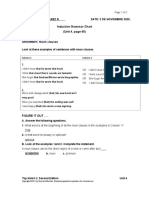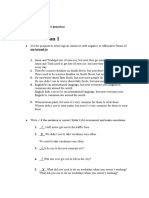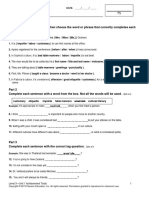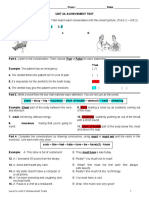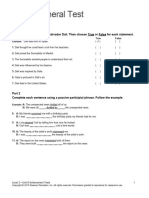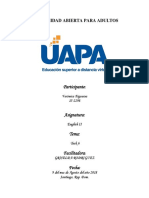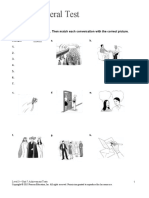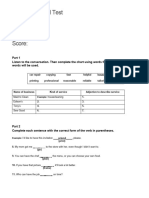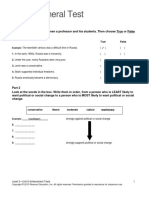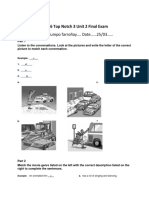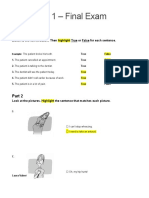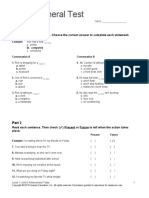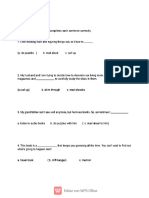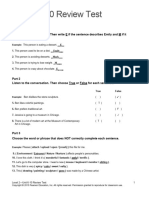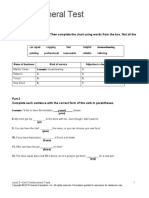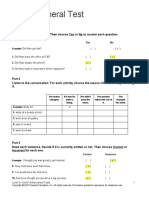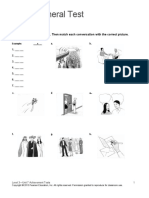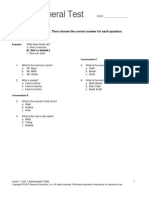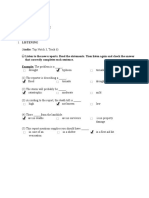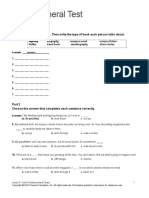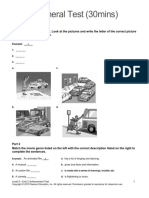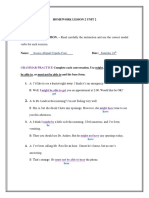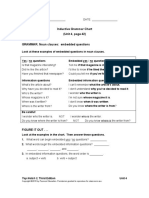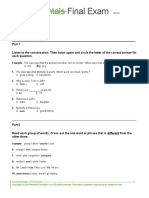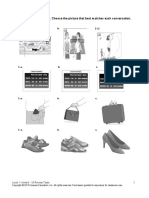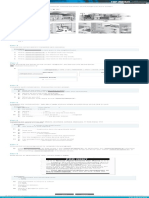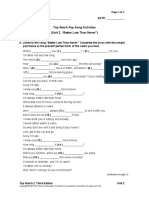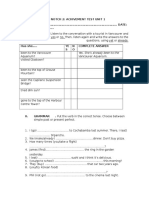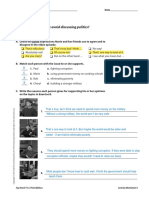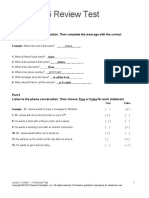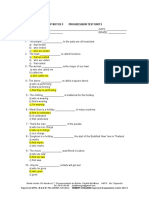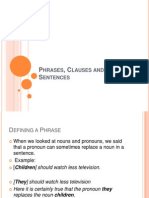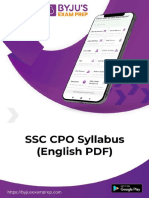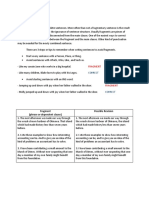TN3 Unit 1,2assessment
TN3 Unit 1,2assessment
Uploaded by
Lincoln CourseCopyright:
Available Formats
TN3 Unit 1,2assessment
TN3 Unit 1,2assessment
Uploaded by
Lincoln CourseOriginal Description:
Original Title
Copyright
Available Formats
Share this document
Did you find this document useful?
Is this content inappropriate?
Report this DocumentCopyright:
Available Formats
TN3 Unit 1,2assessment
TN3 Unit 1,2assessment
Uploaded by
Lincoln CourseCopyright:
Available Formats
Unit 1,2 General Test
Student:
Part 1 - LISTENING
Listen to the conversations. Then choose the word or phrase that correctly completes
each sentence.
Example: The woman prefers to be called ( Mrs. / Miss / [Ms.] ) Graham.
1. It is ( impolite / taboo / customary ) to use first names at this office.
2. Ayako registered for the conference ( before / after / when ) it was announced.
3. In Sophia’s culture, it’s ( bad table manners / taboo / impolite ) to eat beef.
4. The man would like to be called by his ( first name / title and last name / nickname ).
5. They are talking about ( table manners / greetings / punctuality ).
6. First, Ms. Pilman ( taught a class / became a doctor / went to her doctor ).
7. In Patricia’s culture, it’s considered ( offensive / good etiquette / customary ) for a student to use a teacher’s
first name.
Part 2
Complete each sentence with a word related to the topic.
Example: It’s appropriate to make ____small talk______ when you first meet a person.
8. I think is important for people who move to another country.
9. When I was a child, it was considered bad to put your elbows on the table.
10. Eating with your mouth open is in our culture.
11. Different cultures have different rules about , or what is considered polite.
Level 3—Unit 1 Achievement Tests 1
Part 3
Complete each sentence with the correct tag question.
Example: She was in Thailand last semester, _____wasn’t she_____?
12. You’re going to New Zealand, ?
13. I’m not enrolled in the class yet, ?
14. Dr. Holland prefers to be called Michael, ?
15. You and I will always be friends, ?
16. They have contacted the director of the program, ?
17. Your parents didn’t grow up in Madrid, ?
18. I’m right about when the paper is due, ?
19. You’d never be that rude, ?
20. It’s taken a long time to finish all this work, ?
Part 4
Read each sentence. Then put the events in the correct order.
Example: I’d already made plans with Patrick when you told me about the party.
_1_ I made plans with Patrick. _ 2_ You told me about the party.
21. By the time she left Spain, she’d learned Spanish pretty well.
She left Spain. She learned Spanish pretty well.
22. He’d already heard the news when his boss told him about the promotion.
He heard the news. His boss told him about the promotion.
23. When we arrived at the office, the meeting had started.
We arrived at the office. The meeting started.
Part 5
Look at some of Laura’s life events. Complete each sentence. Use the past perfect of the
provided verb and already or yet. Use contractions when possible.
Level 3—Unit 1 Achievement Tests 2
Example: By 2009, Laura had gotten married, but she _____hadn’t yet found_____ a new job.
(find)
24. Laura a house when she bought a new car.
(buy)
25. By the time she went to Japan, Laura Japanese language classes.
(begin)
26. When Laura got married, she to Chicago.
(move)
27. By 2012, Laura business school.
(start)
Part 6
Read the article. Then choose True or False for each sentence.
Level 3—Unit 1 Achievement Tests 3
True False
Example: Fashion changes with time. ( ✓) ( )
28. Long ago in France, men dressed similarly to women today. ( ) ( )
29. The culture of fashion has changed a lot over time. ( ) ( )
30. You can know about fashion without knowing designers’ names. ( ) ( )
Level 3—Unit 1 Achievement Tests 4
Writing Test
Choose one of the following topics to write about. Write at least five sentences.
• Think about a time in your life that was extremely busy. Why was it so busy? What had you done by the end of
the time period? Use the past perfect and already or yet in some of your sentences.
• Discuss etiquette in your country. Use some words or phrases from the box and your own words.
cultural literacy customary etiquette impolite
table manners punctuality offensive taboo
Level 3—Unit 1 Achievement Tests 5
Part 1 - LISTENING
Listen to the conversations. Then match each conversation with the correct picture.
Example: ___b___
1.
2.
3.
a. b.
c.
d.
Part 2
Listen to the conversation. Then choose True or False for each statement.
True False
Example: The patient has an emergency ( ✓) ( )
4. The dentist thinks the patient isn’t in a lot of pain. ( ) ( )
5. It’s impossible for the dentist to fix the tooth today. ( ) ( )
6. The dentist may give the patient some medicine. ( ) ( )
Level 3—Unit 1 Achievement Tests 6
Part 3
Look at the pictures. Choose the medication from the box that is best for each symptom
shown. Not all the medications will be used.
antacid antihistamine cough medicine
ointment painkiller vitamins
Example: 8.
______antihistamine_______
7. 9.
Part 4
Write may / might or must to complete each conversation.
Example: A: Hi. I wonder if I might be able to see the dentist.
B: I’ll have to check. He ____may / might_____ have some time after lunch.
10. A: Anna called to say she’s not feeling well and won’t be able to come to work today.
B: She be really sick because she never misses work.
Level 3—Unit 1 Achievement Tests 7
11. A: Dennis broke his hip and an arm in a car accident last night.
B: Oh, no! He be in a lot of pain!
12. A: Can I get an appointment with the doctor today?
B: I don’t know. She not be able to see any patients today.
13. A: The children were so sick yesterday. Do they feel better today?
B: They feel better because they’re outside playing.
14. A: I feel terrible. Do you think I should go to the doctor?
B: I think it’s a good idea. You have something serious.
15. A: Is that a vitamin C drink?
B: Yes, and you should have some. You really like it.
16. A: My sister just called and said she broke her arm.
B: Oh, no. That hurt!
Part 5
Match each incomplete sentence with the letter of the word or phrase that correctly
completes the sentence.
Example: If you feel that you might not be able to stand up, you feel f . a. nauseous
17. Someone who may have broken a bone needs . b. short of breath
18. A person who has a cold is often . c. an injection
19. If you feel like you might not be able to eat anything, you’re . d. coughing
20. A yearly visit to the doctor is called . e. an EKG
21. I had to check that my heart was all right. f. weak
22. Someone who breathes heavily from a brief walk is . g. in the chest
23. If you make a noise whenever you take a breath, you are . h. dizzy
24. I received of medication in my arm. i. an X-ray
25. I’m really I feel like the world is spinning. j. a checkup
26. Pain is one symptom of a heart attack. k. wheezing
Level 3—Unit 1 Achievement Tests 8
Part 6
Read the article. Then choose the sentence in each pair that is true.
Example: Laughter can help reduce stress.
□ When you laugh, you can’t have any stress.
27. □ Laughter can cause headaches.
□ Laughter can help your body fight disease.
28. □ Laughter is a good form of exercise.
□ If you laugh, you might not need exercise.
29. □ Laughter causes pleasant memories.
□ Laughing keeps your brain healthy and helps you remember things.
30. □ Doctors may prescribe laughter instead of medicine.
□ Doctors may prescribe laughter along with other things.
Level 3—Unit 1 Achievement Tests 9
You might also like
- Lesson Plan Form and ParagraphDocument8 pagesLesson Plan Form and ParagraphLeeLowers40% (10)
- Top Notch 3a Test - Units 1-5Document6 pagesTop Notch 3a Test - Units 1-5MohammadjavadNo ratings yet
- Top Notch 3 Final ExamDocument8 pagesTop Notch 3 Final ExamChuck BirdNo ratings yet
- Conversation Cheat Sheet PDFDocument27 pagesConversation Cheat Sheet PDFNaman Tyagi100% (2)
- Inductive Grammar Chart (Unit 4, Page 40) : Column 2 Column 1 1Document4 pagesInductive Grammar Chart (Unit 4, Page 40) : Column 2 Column 1 1Vanessa Suárez RodríguezNo ratings yet
- Activity #1: If The Sentence Is Correct. Write X If It Is Incorrect and Make CorectionsDocument1 pageActivity #1: If The Sentence Is Correct. Write X If It Is Incorrect and Make CorectionsKimberly FrancoNo ratings yet
- TN3 Unit 1 AssessmentDocument4 pagesTN3 Unit 1 AssessmentMedina M. JoseNo ratings yet
- Final Test 51 TNDocument3 pagesFinal Test 51 TNosamyy100% (1)
- Unit 2A Lylley CortesDocument3 pagesUnit 2A Lylley CortesCaro Palta Medina100% (1)
- First Mid Term TestDocument7 pagesFirst Mid Term TestJUAN DAVID MONTERROZA SIMPSON ESTUDIANTENo ratings yet
- E8 GD Unit - 2 - AssessmentDocument5 pagesE8 GD Unit - 2 - AssessmentJhonatanRuedaBotelloNo ratings yet
- Word Box. Use Each Verb Only Once.: Level 3-Unit 2 Achievement Tests 1Document3 pagesWord Box. Use Each Verb Only Once.: Level 3-Unit 2 Achievement Tests 1Caro Palta MedinaNo ratings yet
- TN2 U8 AssessmentDocument6 pagesTN2 U8 AssessmentTrịnh Quang MinhNo ratings yet
- Task 6Document7 pagesTask 6veronicaNo ratings yet
- Top Notch Fundamentals Assessment Final ExamSSDocument8 pagesTop Notch Fundamentals Assessment Final ExamSSFernando BenitezNo ratings yet
- Unit 7 General Test: Listen To The Conversations. Then Match Each Conversation With The Correct PictureDocument4 pagesUnit 7 General Test: Listen To The Conversations. Then Match Each Conversation With The Correct Picturesebastian lopezNo ratings yet
- TN3 - Unit - 3,4 AssessmentDocument8 pagesTN3 - Unit - 3,4 AssessmentLincoln CourseNo ratings yet
- Unit 8: Complete Each Sentence With The Comparative Form of The Adjective. Use Than If NecessaryDocument4 pagesUnit 8: Complete Each Sentence With The Comparative Form of The Adjective. Use Than If NecessaryJessica Johanna Vazquez AdameNo ratings yet
- A1 Regular 8 Midterm Exam Top Notch 2 Unit 5Document5 pagesA1 Regular 8 Midterm Exam Top Notch 2 Unit 5gloria alzaNo ratings yet
- TN3 Unit 9 AssessmentDocument6 pagesTN3 Unit 9 AssessmentAshley Solis100% (1)
- Regular 6 Top Notch 3 Unit 2 Final Exam: Name Anthony Llumpo Farroñay . Date 25/03Document7 pagesRegular 6 Top Notch 3 Unit 2 Final Exam: Name Anthony Llumpo Farroñay . Date 25/03a͓̽n͓̽t͓̽h͓̽o͓̽n͓̽y͓̽ ͓̽ ͓̽ ͓̽l͓̽l͓̽u͓̽m͓̽p͓̽o͓̽ ͓̽ f͓̽a͓̽r͓̽r͓̽o͓̽ñ͓̽a͓̽y͓̽No ratings yet
- Advanced 1 - Final Exam (TN3)Document8 pagesAdvanced 1 - Final Exam (TN3)Laura MarínNo ratings yet
- General Test Unit 5Document6 pagesGeneral Test Unit 5Aramoix Edwards100% (1)
- UNIT - 04 - Extra - Gram - Exercises, Jeanne Sanchez 22-0291Document4 pagesUNIT - 04 - Extra - Gram - Exercises, Jeanne Sanchez 22-0291Jeanne Sanchez100% (1)
- B1 Regular 11 Final Exam Top Notch 3 Unit 2Document6 pagesB1 Regular 11 Final Exam Top Notch 3 Unit 2Ricardo SanchzNo ratings yet
- Unit 8Document7 pagesUnit 8Minh Nhựt100% (1)
- Unidad 1englishDocument13 pagesUnidad 1englishPatria Cabral RojasNo ratings yet
- TN2 U6 10 AssessmentDocument5 pagesTN2 U6 10 Assessmenthoaian260114No ratings yet
- TN3 Unit 3 AssessmentDocument7 pagesTN3 Unit 3 AssessmentChloeNo ratings yet
- Unit 3 General Test Course 3Document5 pagesUnit 3 General Test Course 3Hilthongidalthi100% (1)
- Josue David - TN3 - Unit - 6.HWDocument7 pagesJosue David - TN3 - Unit - 6.HWjasirNo ratings yet
- TN3 Unit 7 Test-10-12Document6 pagesTN3 Unit 7 Test-10-12Samuel MuñozNo ratings yet
- Top Notch 1 Unit 1 AssessmentDocument6 pagesTop Notch 1 Unit 1 AssessmentNguyen Bao Ngoc QP2579No ratings yet
- Topnotch 3 Final Exam: ListeningDocument1 pageTopnotch 3 Final Exam: ListeningVanessa Suárez RodríguezNo ratings yet
- TN3 Unit 4 AssessmentDocument6 pagesTN3 Unit 4 AssessmentJulius Fernandez Montiel100% (2)
- Top Notch Fundamentals Final ExamDocument19 pagesTop Notch Fundamentals Final ExamChuck BirdNo ratings yet
- Jose Osco Pineda - Examen 1.Document5 pagesJose Osco Pineda - Examen 1.joseNo ratings yet
- Unit 2 General Test (30mins) : Example 1. 2. 3. A. CDocument5 pagesUnit 2 General Test (30mins) : Example 1. 2. 3. A. CTiến Duy VũNo ratings yet
- CC JaDocument3 pagesCC JaJessica CepedaNo ratings yet
- Inductive Grammar Chart (Unit 4, Page 42) : Top Notch 3, Third EditionDocument1 pageInductive Grammar Chart (Unit 4, Page 42) : Top Notch 3, Third EditionMarcela A. BenitezNo ratings yet
- 4ta Tarea de Ingles Avanzado IIDocument34 pages4ta Tarea de Ingles Avanzado IIabiel jimenezNo ratings yet
- TN1 Unit 5 AssessmentDocument6 pagesTN1 Unit 5 AssessmentJhon VallejoNo ratings yet
- Examination - 12 July 2023 - A2Document10 pagesExamination - 12 July 2023 - A2jahir orlando uribe alzateNo ratings yet
- Unit 7 General Test: Listen To The Conversation. Then Choose The Correct Answer For Each QuestionDocument4 pagesUnit 7 General Test: Listen To The Conversation. Then Choose The Correct Answer For Each QuestionJuliana Acevedo SalazarNo ratings yet
- Write The Words and Phrases in The Correct Order. Example:: He'll Have His Assistant Copy A Few Extra PagesDocument1 pageWrite The Words and Phrases in The Correct Order. Example:: He'll Have His Assistant Copy A Few Extra PagesVanessa Suárez RodríguezNo ratings yet
- TN1 Achivement Test Unit 7Document4 pagesTN1 Achivement Test Unit 7AldahirRGarciaRodriguezNo ratings yet
- TN1 Units 6 10 Assess EXPRDocument6 pagesTN1 Units 6 10 Assess EXPRLucas gonçalvesNo ratings yet
- Unit 8 General Test - Mode Solve - Unit 8 Unit 8 Review Tests - Dsm21d - MyEnglishLabDocument1 pageUnit 8 General Test - Mode Solve - Unit 8 Unit 8 Review Tests - Dsm21d - MyEnglishLabkitzo cuéllarNo ratings yet
- Test Unit 3Document7 pagesTest Unit 3ANTONIO RIAÑONo ratings yet
- Top Notch 2-Test 1Document4 pagesTop Notch 2-Test 1daniionaNo ratings yet
- Fundamentals Unit 12 AssessmentDocument7 pagesFundamentals Unit 12 AssessmentEl PedroNo ratings yet
- Answer Key Song Activities PDFDocument6 pagesAnswer Key Song Activities PDFDaiana JonesNo ratings yet
- General Test Unit 5Document6 pagesGeneral Test Unit 5Brian AcevedoNo ratings yet
- (Unit 2, "Better Late Than Never") : Top Notch Pop Song ActivitiesDocument3 pages(Unit 2, "Better Late Than Never") : Top Notch Pop Song Activitieselreflejodelpoeta2No ratings yet
- Top Notch 2 Unit 1 Test - CompressDocument5 pagesTop Notch 2 Unit 1 Test - CompressAlexis TDíazNo ratings yet
- Unit 5-7 General Test: (AUDIO 1)Document5 pagesUnit 5-7 General Test: (AUDIO 1)Michelyn AraújoNo ratings yet
- SCENE 1 UNIT - 09 - TV - Activity - Worksheets-1Document1 pageSCENE 1 UNIT - 09 - TV - Activity - Worksheets-1María Fernanda Vásquez ChavarríaNo ratings yet
- ADRIAN SANCHEZ SUSEN ESTUDIANTE ACTIVO FinalDocument9 pagesADRIAN SANCHEZ SUSEN ESTUDIANTE ACTIVO FinalAdrianSanchezSusenNo ratings yet
- Top Notch 3 Unit 5 With AnswersDocument3 pagesTop Notch 3 Unit 5 With AnswersFernando PérezNo ratings yet
- TN1 Unit 4 AssessmentDocument6 pagesTN1 Unit 4 AssessmentElisabete Barbosa0% (1)
- Inductive Grammar Chart (Unit 1, Page 6) : Top Notch FundamentalsDocument1 pageInductive Grammar Chart (Unit 1, Page 6) : Top Notch FundamentalsSalvador Yana RocaNo ratings yet
- Unit 1 - PracticeDocument6 pagesUnit 1 - Practicequynhpn3972No ratings yet
- Poetry and Figures of SpeechDocument3 pagesPoetry and Figures of SpeechMazhar CheemaNo ratings yet
- Connectionist Psycholinguistics: Capturing The Empirical DataDocument7 pagesConnectionist Psycholinguistics: Capturing The Empirical DataAlton Melvar Madrid DapanasNo ratings yet
- Heart of A TreeDocument10 pagesHeart of A TreePijush Kanti GhoshNo ratings yet
- Module1&2-Internet Technology AnswerDocument83 pagesModule1&2-Internet Technology AnswerDebojyoti Saha100% (1)
- Junior 4 BinderDocument16 pagesJunior 4 BinderE V RNo ratings yet
- Natural Language Processing With QuranDocument6 pagesNatural Language Processing With QuranAznil Azni100% (1)
- Machine-Level Programming Iii: Switch Statements and Ia32 ProceduresDocument65 pagesMachine-Level Programming Iii: Switch Statements and Ia32 Proceduresdarwinvargas2011No ratings yet
- Shrunk-The Elements of StyleDocument34 pagesShrunk-The Elements of StyleCross+Flame100% (13)
- Root Words EnglishDocument2 pagesRoot Words Englishfiresail5No ratings yet
- 240 IELTS Speaking Topics @IELTSDocument78 pages240 IELTS Speaking Topics @IELTShussy hussyNo ratings yet
- Phrases and ClausesDocument18 pagesPhrases and ClausesAngelica Mandiola100% (1)
- Challenges 1, Module 8, Lesson 1Document2 pagesChallenges 1, Module 8, Lesson 1Dragana MilosevicNo ratings yet
- SSC Cpo Eng 80 32Document6 pagesSSC Cpo Eng 80 32Tŕəñdinğ TəjNo ratings yet
- Oficina de Bilingüismo Fundación Universitaria Tecnologico ComfenalcoDocument9 pagesOficina de Bilingüismo Fundación Universitaria Tecnologico ComfenalcoLau AmadorNo ratings yet
- Fragments: Fragment (Phrase or Dependent Clause) Possible RevisionDocument3 pagesFragments: Fragment (Phrase or Dependent Clause) Possible RevisionRona CabahugNo ratings yet
- UAS - Second Language Acquisition - SAMID SARIPIDocument2 pagesUAS - Second Language Acquisition - SAMID SARIPIsamid saripiNo ratings yet
- Carlos E Roscoe. Traducción de Artículos PDFDocument182 pagesCarlos E Roscoe. Traducción de Artículos PDFmiriamperandones748No ratings yet
- Edukasyon Sa Pagpapakatao: Pagiging PilipinoDocument2 pagesEdukasyon Sa Pagpapakatao: Pagiging PilipinoVilma TayumNo ratings yet
- Desislava Stankova (CV)Document3 pagesDesislava Stankova (CV)borilbogoevNo ratings yet
- Nilai 2019-2020Document9 pagesNilai 2019-2020Baar HanifNo ratings yet
- Gabriela Gonzalez Assignmet 1. Unit 7Document3 pagesGabriela Gonzalez Assignmet 1. Unit 7Gaby GonzálezNo ratings yet
- Critical Book Review: Fithrah Nurul Hidayah 2193121013Document6 pagesCritical Book Review: Fithrah Nurul Hidayah 2193121013Fithrah NurulNo ratings yet
- Final Revision Sheet A.L Prim.5 Second Term 2014 - 2015Document8 pagesFinal Revision Sheet A.L Prim.5 Second Term 2014 - 2015TFattahNo ratings yet
- Xpeditor MaterialDocument447 pagesXpeditor MaterialtamilarasanNo ratings yet
- A Identifying V-WPS OfficeDocument5 pagesA Identifying V-WPS OfficeElaine MorenoNo ratings yet
- COMMMEET32Document47 pagesCOMMMEET32Jal Ley HaaNo ratings yet
- Movers RevisionDocument4 pagesMovers RevisionAndrew TurveyNo ratings yet
- 978 0 8223 6368 2 - 601Document31 pages978 0 8223 6368 2 - 601JjossuaNo ratings yet




